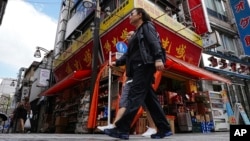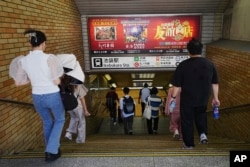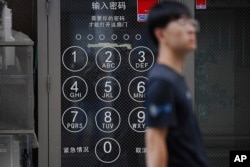China has used transnational harassment and intimidation to prevent Chinese people living in Japan from engaging in protests and activism, a new report by Human Rights Watch said.
Most of the 25 Chinese people interviewed by Human Rights Watch, including ethnic minorities from Xinjiang, Tibet and Inner Mongolia, said Chinese police have warned them, sometimes through their relatives in China, against taking part in activities or peaceful protests critical of the Chinese Communist Party and its rule over China.
“Several ethnic Uyghurs from Xinjiang said that Chinese authorities contacted them through their relatives back home, and the police told them to either stop their anti-Chinese government activities in Japan or pressed them to share information about Japan’s Uyghur community,” the report said.
Analysts say that while Chinese authorities haven’t used physical violence to intimidate Chinese people in Japan, they are still able to deter them from continuing their activism abroad.
“Beijing’s strategies targeting the Chinese diaspora community in Japan are sophisticated, because while they keep their threats relatively low-key — which is less likely to attract the Japanese government’s attention — it’s still enough to scare members of the diaspora community,” Teppei Kasai, Asia program officer at Human Rights Watch, told VOA by phone.
Some Japanese experts say Beijing’s transnational repression has created a chilling effect within the Chinese diaspora in Japan.
“More and more Chinese and Hong Kong people in Japan are minimizing their participation in public events, especially those related to sensitive issues, because they are concerned about facing retaliation from the Chinese government,” said Tomoko Ako, a China studies professor at the University of Tokyo.
The Chinese foreign ministry and the Chinese Embassy in Japan didn’t respond to VOA’s requests for comments.
When responding to a similar question in August, the Chinese Embassy in Washington told VOA that China “strictly abides by international law and fully respects the law enforcement sovereignty of other countries.”
Targeting activists’ families
Human Rights Watch said Chinese authorities often try to intimidate activists in Japan by targeting their family members in China.
In one case, a Chinese activist in Japan told Human Rights Watch that local police in Inner Mongolia interrogated his relatives, restricted their freedom of movement and prevented them from getting their passports after he took part in public protests against the Chinese government’s policy of replacing the Mongolian language with Mandarin Chinese at school.
The activist, who used the pseudonym A.B. because of security concerns, said the pressure his family members face has instilled in him a sense of guilt.
“My [relatives] tell me they’re afraid of the pressure they’re feeling, and that has been tough on me,” he told Human Rights Watch.
In another case, Hong Kong activist Alric Lee told VOA that his parents received a letter listing all the activities he had joined in Japan and demanded that they publicly apologize for “his wrongdoings.”
“They were asked to apologize for what I’ve done in Japan and publicly renounce their relationship with me,” he said in a phone interview, adding that his parents asked him to stop his activism in Japan after receiving the letter.
Since the letter included detailed records of his activities in Japan, Lee said he thought the threat might have been initiated by the Hong Kong government.
In addition to threats against family members, Lee said he and other members of the Hong Kong diaspora in Japan have been followed by unknown individuals after organizing or taking part in public activities.
Lee said these threats have forced him to reevaluate the potential consequences of his activism in Japan.
“I’m definitely thinking twice before taking part in activities, but since I don’t think I have done anything wrong, I don’t think I’ll change anything concerning my activism in Japan,” he told VOA.
No confidence in Japan
Despite the threats, some Chinese people told Human Rights Watch that they didn’t seek help from the Japanese police because of fear of reprisal or because they didn’t think doing so would resolve the problems they were facing.
“Some people said they think Japanese authorities can’t do much about what the Chinese police have done to them, and they feel that the Chinese government would find out if they try to seek help from the Japanese police,” Kasai told VOA.
In a written response to inquiries from VOA, the Japanese foreign ministry declined to comment on transnational repression against Chinese people in Japan and what the Japanese government can do to safeguard their basic rights. Officials said both matters were related to “foreigners in Japan.”
Ako said the Japanese government’s reluctance to comment on Beijing’s transnational repression against Chinese people in Japan reflects Tokyo’s attempt to avoid increasing tensions between the two countries.
“The Japanese government probably doesn’t want to heighten tensions with China, but I think it is their basic responsibility to publicly comment on this concerning trend that’s happening in Japan,” she told VOA by phone.
Kasai said since Japan and 54 other countries at the U.N. Human Rights Council condemned transnational repression and vowed to hold those responsible accountable in June, Tokyo should consider establishing mechanisms to help protect the basic rights and safety of those being intimidated.
“The Japanese police should try to create a system that allows Chinese people to report their experiences of facing transnational repression initiated by the Chinese government,” he told VOA, adding that such a system should include safeguards for individuals’ privacy.
Kasai and Ako said they thought the Japanese government should go further.
“I think human rights should remain an important aspect of Japan’s bilateral engagement with China, so I believe Tokyo should try to raise the issue of Beijing’s transnational repression against Chinese people in Japan during bilateral meetings,” Ako said.






